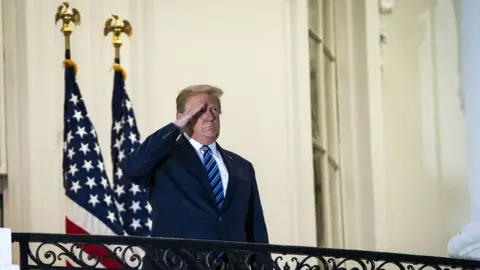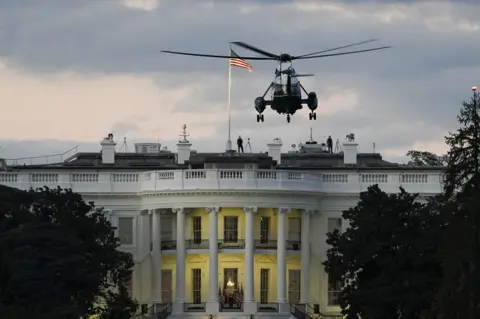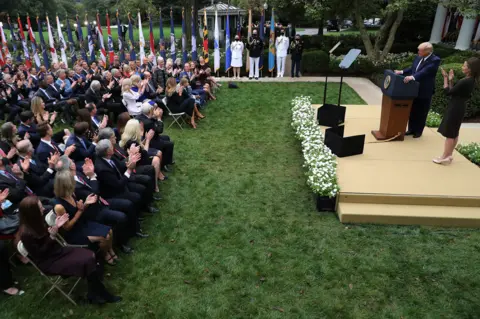US election 2020: The defining moment of the Trump presidency

 Getty Images
Getty ImagesWhat four years ago would potentially have been regarded as the defining moment of the Trump presidency?
For his red-capped supporters, perhaps it might have been the completion of a wall along the southern border, celebrated with a topping-out ceremony at which the Mexican president handed over a cheque to cover the costs of its construction.
Maybe it would have been the sight of China capitulating in a trade war or North Korea surrendering its nukes. Or, more fantastically, the spectacle of Hillary Clinton being placed in handcuffs as she was led off to a federal penitentiary, the "lock her up!" chant made real.
None of those things, of course, has come to pass.
Instead, future historians of Donald Trump's first - and possibly final - term in the White House will regard the coronavirus crisis as its defining event and the president's contraction of Covid 19 as its culminating moment.
Now we have pictures that will forever mark this strange, near-dystopian, chapter in the American story - the images of President Trump returning to the White House, striding up the staircase to the balcony of the executive mansion, dramatically removing his face mask and then saluting the Navy helicopter that had Medevaced him to the Walter Reed National Military Medical Center last Friday and returned him on Monday night.
This intricately choreographed homecoming was instantly packaged up, with cinematic music and slow-motion videography, then tweeted to the president's 87 million followers. And the final product proved to be politically interchangeable. Though it was intended as a Trump campaign ad, it works also as a Biden attack ad.
The mask-less salute from the balcony was followed by a presidential pep talk, again distributed via Twitter.
"Don't be afraid of it," he said of the virus that has killed more than 210,000 of his compatriots. "Don't let it dominate your lives," he counselled, repeating the language of one of the more extraordinary tweets of his presidency from earlier in the day. Traditionally, at times of national crisis, unifying words are broadcast from the White House. These had the opposite effect.
To admirers of the president it was akin to a Brandenburg Gate moment, when Ronald Reagan faced down communism and delivered the most electrifying speech of the Cold War era. To detractors, it was more like a Mission Accomplished misstep, when George W Bush prematurely declared the end of major US combat operations in Iraq.
Let us also hope that Donald Trump was not precipitate in declaring his own personal victory. I myself contracted Covid early in the outbreak, and so, too, did my wife. As we made the journey back to health, good days were followed by the bad. Six months on, still there are lingering effects.
Catnip to his base, Trump's short address was the sort of "land-of-the-brave, home-of-the-free" rhetoric that makes Fox News evening anchors and morning talkback radio go weak at the knees.
But how did those words sound to doctors and nurses just about to commence their night shifts in the hospitals treating patients? How would they have been met by public health officials on the president's own team who have urged people to wear masks and who are presently charting more than 40,000 new cases each day?
How would that rousing speech have been received by relatives mourning the dead?
Also, it is worth bearing in mind the backdrop for his speech - a White House that has become a Covid hotspot. Its floodlit portico looked as magnificent as ever, but this presidential mansion has much in common now with one of those meatpacking plants in rural America which the virus has also ravaged.
"The Blight House" was this morning's headline in the New York Daily News.
Those pictures of the president's triumphant return serve as a Rorschach test, an indicator that immediately locates which America you inhabit - the part of the country that regards Trump as the personification of American greatness, a strongman who has purportedly defeated the "China virus" or the America that regards him as national lampoon, a mad king who still doesn't appreciate the enormity of an outbreak.
Was it an inspiring display of old-fashioned American manhood or a buffoonish show of toxic masculinity? Were they words of reassurance or recklessness?
Instantly, the two Americas assumed their normal battle-lines, which you could cross last night from the comfort of your sofa by changing channels from CNN to Fox News.
What we are witnessing is national disunity on steroids - the pandemic as an accelerant of polarisation. Gone is the bygone age when the infirmity of a president would rally the nation, as it did when Dwight D Eisenhower suffered a heart attack in 1955 or Reagan recovered from the attempt on his life in 1981.
That was another America, widely regarded as much greater than the chronically divided nation we inhabit today.
Even before the theatrics at the White House, Donald Trump's contraction of the virus presented so many hallmarks of his time in office. Despite being hospitalised, his presidency remained omnipresent.
There were tweets, offering ALL CAPS proof that his social media vital signs were all functioning as normal. There were those video messages, the personal updates on his condition recorded in a room at his hospital suite that bore a striking resemblance to the set from Celebrity Apprentice. In this media-saturated age, and during this media-saturated event, he maintained his media-saturated presence in national life.
Arguably, this has always been more of a television presidency than a Twitter presidency, and inevitably he eyed the visual possibilities of his hospital stay.


His drive-by "photo-op", when his limousine paraded past supporters gathered outside the gates of the hospital, was classic Trump. The presidential motorcade has become a symbol of American might, its length a measure of US power. But perhaps the most memorable image from that day was not the president waving to a relatively small number of supporters, but a Secret Service office decked out in the kind of PPE equipment that we have come to associate with Covid emergency rooms.
As is so often the case in this administration, reliable information has been hard to come by since the president announced, via Twitter, that he had tested positive.
There have been contradictory storylines, with the White House chief of staff offering a far more pessimistic view of the president's health over the weekend than the White House doctor.
There have also been contested timelines. "When was the president's last negative test?" has become the "what did the president know and when did he know it?" of this crisis.
And it's an important, and so far unanswered question, because it will tell us whether or not the president knew he had Covid last week when he travelled to New Jersey for a fundraiser and rally.
The president's stay in hospital also underscored how White House officials who are supposed to brief the American people always seem more conscious of their audience of one, and fear how their words will be judged by the president.
When his personal physician, Dr Sean Conley, was asked why he hadn't informed the press that his patient had been given supplemental oxygen, his response was extraordinary: "I did not want to give any information that might steer the course of the illness in another direction."
 Getty Images
Getty ImagesEither he thought honesty is a dangerous pathogen, or was worried how the president would react.
As is so common in modern-day America, there is not even an agreed upon set of facts. I was struck last week, when the news of the president's illness spread, how many people did not believe he truly had Covid.
Many of the Democratic voters I spoke to in Michigan the next morning thought it was a ruse to distract from his debate performance a couple of nights earlier. Even this morning, a Harley-riding New Yorker that I run into most mornings claimed it was all a big hoax, a stunt to improve President Trump's poor poll numbers.
In a presidency where fact-checkers have chronicled more than 20,000 falsehoods, many Americans no longer trust what their government is telling them. That is hugely problematic. A healthy democracy needs to be grounded in truth, but there are times when this country feels like it is fast becoming a confederacy of conspiracy theorists. It is as if truth has become the first casualty of political war.
Has this experience changed the 74-year-old president?
There were fleeting moments, notably when he tweeted the word "LOVE!!!", that hinted at some kind of epiphany. He also suggested he had gained a greater understanding about the virus, that this was a teachable moment. But where is the evidence to suggest that catching Covid has made him a more empathetic figure?

Read more from Nick

On Monday, he fired off more than 25 tweets, but not one of them mentioned the other members of his administration or political inner circle who have tested positive. Nor did his Twitter feed, or speech from the White House balcony, display any compassion for compatriots who have also been infected or those who have suffered bereavement.
The broader meaning of that dramatic White House return will be mulled over for years to come. Those concerned about a creeping authoritarianism will regard it as another of those occasions when Donald Trump looked more like a potentate than a conventional US president. Already his critics are drawing comparisons with Il Duce, and mocking him as an American Mussolini.
But once more, it is worth pointing out that many of his admirers yearn for an American strongman, and will be just as untroubled by last night's pictures as they were by his refusal to commit to a peaceful transfer of power in the event of his defeat.
It speaks of one of the paradoxes of the Trump years - many of those who complain that the Covid restrictions represent a threat to the American liberty fought for in the Revolutionary War do not have a problem with a president who sometimes gives the appearance of craving the untrammeled power of an old-style monarchy.
Politically speaking, my hunch would be that the president's illness will be reinforcing rather than transformative.
For his critics, the fact that he himself has contracted Covid underscores his administration's mishandling of the crisis. They will seize upon last week's Rose Garden event for his Supreme Court nominee, Amy Coney Barrett - where attendees sat shoulder to shoulder as they celebrated the replacement of a liberal icon, Ruth Bader Ginsburg, with a staunch conservative - as proof of his recklessness.
 Getty Images
Getty ImagesMoreover, they will point to the government healthcare he received, and note the disparities of care with others who are not so privileged.
For his supporters, his speedy recovery - if it truly is that - demonstrates his indomitable strength and shows that he was right to lead from the front rather than hide away in a bunker. Also, they will claim, he was right to downplay the virus and to demand a speedy reopening of the economy.
Last night's pictures stood in such marked contrast from a late-night return to the White House in June, when he stepped off Marine One looking unusually bedraggled, with his shirt open and his tie undone, following his sparsely-attended stadium rally in Tulsa.
Now he has a steroid-assisted spring in his step, but he is trailing a long way behind in the polls and running out of time to make a political recovery.
